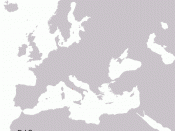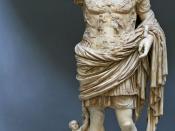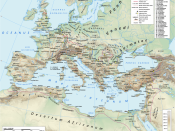Rome's republican institutions, designed for a city-state, proved incapable of coping with the problems created by the conquest of a world empire. But after Octavian's brilliant statesmanship brought order out of chaos, Rome entered its golden age under the rule of emperoros. For more than two hundred years, from 27 B.C. to A.D. 180, the Mediterranean world enjoyed unparalleled peace and stability.
During its time of trouble, Rome also experienced an intellectual crisis. Forsaking the rational and secular values of classical humanism, many Romans sought spiritual comfort in Near Eastern religions. One of these religions, Christianity, won out over its competitors and was made the official religion of the Empire. Christianity would become the principal shaper of the European civilization that emerged from the ruins of Rome.
AUGUSTUS AND THE FOUNDATIONS OF THE ROMAN EMPIRE:
* Octavian recognized that only a strong monarchy could rescue Rome from civil war & anarchy.
* Octavian demonstrated his political genius by reconciling his military monarchy w/ republican institutions: he held absolute power without abruptly breaking w/ a republican past.
* Octavian refused to be called king or even, like Caesar, dictator: instead, he cleverly disguised his autocratic rule by taking the inoffensive title princeps (first citizen). The Senate also honored Octavian by conferring on him the semireligious and revered name Augustus. [The rule of Augustus and his successors is referred to as the principate.]
* The reign of Augustus signified the end of the Roman Republic and the beginning of the Roman Empire--the termination of senatorial rule and aristocratic politics and the emergence of one-man rule.
* As Rome became more autocratic and centralized, it took on the appearance of an oriental monarchy.
* Augustus introduced the practice of emperor worship. The imperial cult, with its ceremonies, processions, temples, and statues, strengthened...


